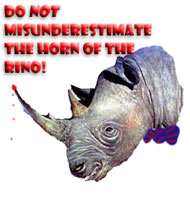October 26, 2004
The Crystal Ball Update
From Larry Sabato:
Posted by Steve at October 26, 2004 09:56 AM | TrackBackGeorge W. Bush has a slight edge in the last week of the election, but his lead is paper-thin. It must be worrisome to his campaign that he is currently lacking a 3 percent to 5 percent polling advantage in many essential battleground states. Bush may well need this beyond-the-margin-of-error buffer to overcome the torrid Democratic antipathy to the president that could easily produce a larger-than-expected Democratic turnout on Election Day. And let's not forget the Crystal Ball's assessment that the remaining, hard undecided voters--perhaps 4 percent to 5 percent of the electorate--are still inclined to break against Bush, possibly by a sizeable margin. (Yes, some won't vote, but those that do are probably going to tilt to Kerry by 55 percent to 45 percent or even more.) Given the 2000 election results, Bush appears to have a slim overall popular vote lead, but he is not doing as well in many of the key battleground states necessary for an Electoral College victory. (Bush is performing better than he did in 2000 in Democratic states such as Michigan and New Jersey, increasing his chances to capture the elusive popular vote; still, we'll see if this holds up once the inevitable and enormous California popular majority for Kerry is tabulated.)At the same time, John Kerry is also in the danger zone, having not solidified parts of the Democratic base and even some Democratic-leaning states a mere week before the election. Given Bush's substantial burdens as the incumbent--a contentious war, a mediocre economy, and all the rest--it is an unflattering commentary about Kerry the campaigner that he has not led Bush fairly consistently, as Jimmy Carter did President Ford in 1976 and Bill Clinton did President Bush Sr. in 1992. And Kerry must worry that Karl Rove's carefully planned GOP GOTV program will turn out to be as or more effective than this year's Democratic effort. Of course, one of the 2004 major-party candidates has to win, if not on Nov. 2, then eventually, after the legal interventions and judicial process have worked their will and taken their toll on the nation's psyche. So what is going on?
Here's the context: By mid-year the President faced modest to long historical odds against his reelection, having fallen behind his challenger while bedeviled by a weak economy and an increasingly controversial foreign war. Unlike his father in 1992, who organized poorly for a strong challenge, this Bush and his team put together arguably the most impressive organization ever for a threatened chief executive. Bush fought his way back into contention much as Harry S. Truman did in 1948, and Truman was the only other incumbent in the age of polling to win a second term after having trailed for much of the campaign year. (http://www.centerforpolitics.org/crystalball/article.php?id=LJS2004052001) Another notable comparison: Truman inherited his first term upon FDR's death, and Bush's term was part-inheritance from Bush I and part-award from the Supreme Court after losing the popular vote. From the start, both Truman and Bush faced dicey election prospects the next time around.
After a great convention and an even better September, Bush seemed to be cruising to a second term until the debates. As we argued last week (http://www.centerforpolitics.org/crystalball/article.php?id=LJS2004101901), Kerry's overall debate victory wiped out the entire Bush margin. But as soon as the debates ended, a slight Bush lead reemerged. Memories are short in America, and Kerry has never--to this day--become completely acceptable as a potential president because of the three L's: liberalism, lack of likeability, and the leadership deficit (indecisiveness/flip-flopping). Given Bush's severe electoral problems, had Kerry been able to break out even on one or two of these measures, he would today be leading Bush by at least a few points, possibly more. Bush has had a weak hand, and it's gotten worse in the last stage of the campaign with the flu shot debacle, rising oil prices, a falling stock market, and the continuing turmoil in Iraq. Yet other than his debating skills, John Kerry has not had the moderate views and personal attributes--such as warmth--needed to capitalize fully on the president's weaknesses and the bad news that has dogged the White House. Moreover, President Bush's post-9/11 image as a strong and decisive wartime leader has kept him afloat--even somewhat dry, despite the deluge.
Still, we believe that the presidential election is teetering on the edge of the butter-knife. Bush may hang on to win, but it doesn't take any mental strain to see the White House falling Kerry's way. Here's why:
1. Bush's lead is minimal for an incumbent: He is below 50 percent of the vote on average, and his mean job approval is barely 50 percent, or a little less. (As measured by our friends at RealClearPolitics.com, a site we highly recommend to our readers.) Obviously, there are polls well above and well below these averages, but like everyone else, we don't know which survey to believe in this crazy year. Contrary to the conspiracy theories floating around on the net, the pollsters are all trying to do their best to screen for likely voters--which is tough when so many new registrants have come onto the rolls in this calendar year. Bush's average lead hovers around 3 percent--enough for us to give him a tiny edge a week out, but not enough for us to have any confidence that he will win Nov. 2.2. The overall national vote lead for Bush--assuming it is not a mirage--does not always translate to leads where he most needs them. The most compelling case is Ohio. Bush's averages in the state have moved fairly steadily downwards in the last two months, and some reliable surveys now have Kerry leading in a state that Bush needs badly. As we all know, no Republican has ever been elected president without carrying Ohio. Theoretically, Bush could make up for these 20 precious electoral votes in Ohio with some combination of states that Gore won in 2000 but where Bush is competitive, especially Wisconsin (10), Iowa (7), and New Mexico (5). Bush also picked up seven electoral votes in his 2000 states thanks to the last census. Of course, most polls suggest Bush may lose New Hampshire (4) this year, and the scenario we have just outlined assumes no other losses for Bush. This alternative-to-Ohio plan is like threading the eyes of several needles simultaneously: It's possible but difficult.
3. Bush is still not firmly secure in Florida, an absolutely must-win state for him. Even more than Ohio's 20 electoral votes, Bush cannot afford to lose Florida's 27 votes. Game over if that happens. Again, Bush is slightly ahead in the Sunshine State, but a massive Democratic turnout in South Florida could easily upend the current projections.
4. While Ohio especially, and Florida too, are the key Bush trouble spots, the president is not completely out of the woods in Arizona, Arkansas, Colorado, Nevada, and West Virginia. We expect Bush to carry all five states, but an upset in any of them could be fatal to his chances. And every single presidential year since we have closely followed politics has recorded one or more unexpected upsets. (In 2000 Tennessee and West Virginia certainly qualified, both going for Bush.)
5. So what about Kerry? Doesn't he have his fair share of worries? Of course. The Democratic nominee so far is underperforming--compared to winning Democrats--with white men, married women, African-Americans, and Hispanics, just to mention four prominent classifications of voters. In the Electoral College, he may be losing Iowa, Minnesota, New Mexico, and Wisconsin--though we expect Kerry to win some or all of these. In addition, Kerry is apparently not doing as well as Gore in Michigan, New Jersey, and Pennsylvania, though we think Kerry will end up with all three big prizes. Similarly, Bush is faring very well in Hawaii, which Gore carried by 18 percentage points. Despite the current tied polls, we'd bet on a Kerry win there---but it does remind us of 1976, when President Ford shocked Jimmy Carter and nearly carried the Aloha State when almost everyone had expected it to go Democratic by a wide margin. Again, an unhappy surprise for Kerry in any big state on this list would likely end his White House dreams.
Think about the electoral games we have just played. While a handful of states will change sides, and determine the outcome, we are looking at a close replica of the 2000 map, with 40 to 45 states remaining Red or Blue. After all that has happened since November 2000 (9/11, Afghanistan, Iraq, recession, etc.) the fact that the states would line up about the same way four years later is startling. Many political science colleagues claim that the polarization of Red versus Blue is exaggerated, and in some ways it is. But the divisions over the Iraq war, the fight against terrorism, the economy, and the social and cultural issues such as gay rights, gun control, the death penalty, abortion, and stem-cell research are very real, and one can argue that the Red states are getting redder and the Blue states bluer. Election night will tell the tale on polarization, to a degree.
We'd like to make a few other points about the final days of this election before we leave you in peace. (Is there any peace in this election season?)
* This is the week for October surprises. Does either campaign, or both, have something up their sleeve, or is the October surprise the absence of any? Given the fears about terrorist activity, a quiet finish would be most welcome. Even the capture of Osama bin Laden, while delightful, would generate furious conspiratorial speculation with unpredictable consequences on Election Day.
* This is also the week for candidates to throw the kitchen sink, plus all handy kitchen appliances, at their opponent. Could there really be any ammunition left, or will we see simply an intense reiteration of the key themes from both sides? Given the closeness of the election, it might be foolhardy for either campaign, or the news media, to toss a tactical grenade at this late date.
* This is the traditional week for the dirtiest of campaign dirty tricks, in part because the media and law enforcement don't have the time or personnel to follow up and bring the perpetrators to justice before the polls close. As though we needed any more mud or vitriol in this depressingly nasty campaign on both sides. (For more information on likely dirty tricks, consider reading Sabato and Simpson's Dirty Little Secrets: The Persistence of Corruption in American Politics, New York: Random House/Times Books.)
* Finally, this is coattail week, when we begin to get a real sense of the likelihood that down-ballot contests for Senate, House, governor, and even state legislature will be directly influenced by the outcome of the presidential race. We would not be surprised to see a wave develop for the winning party, especially in the competitive Senate match-ups. This year, voters feel so strongly about their presidential choice that we think straight ticket voting will be higher than usual, and ticket splitting will be on the wane. Since so many House races are uncompetitive or unopposed, and there are just 11 gubernatorial contests, the effects of additional straight ticket voting are most likely to show up in close Senate battles. Given the number of tight Senate races in Bush's red states (NC, SC, GA, FL, LA, SD, CO, AK, OK), this could be good news for Republicans fighting for seats in the upper chamber of Congress, assuming Bush's large 2000 margins in most of these states hold up or expand. Again, we'll get some hints as the week unfolds.
Is it just me or does Larry Sabato give all of us political scientists a bad name?
Posted by: Rusty Shackleford at October 26, 2004 02:35 PM



